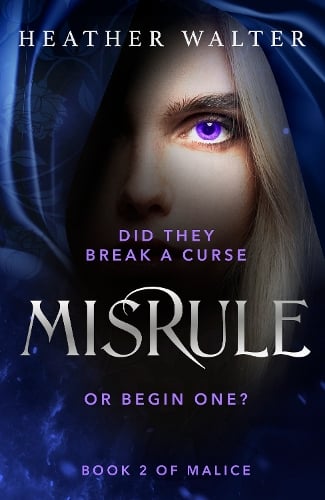

Malice clearly has good intentions, but for me lacks any sort of emotional punch or resonance to make a lasting impression. There’s breadth but no depth, lots of deep and meaningful proclamations but without the meaning behind them to make the reader think ‘this is important’. Worryingly, they all become rather interchangeable, or so generally defined that I soon forgot who was who and had to keep reminding myself. There are good ones, bad ones, young ones, old wise ones… they’re all in there. Characters in Malice say what you expect them to say, and do exactly what you expect them to do, rather as if the book has been produced by committee. Whereas Eddings or Feist would keep the momentum going with an underlying tone of humour and crackling dialogue, here it falls flat. Like in Eddings’ and Feist’s books, the characters in Malice are fair enough, archetypal ones, easy to determine, with destiny clearly awaiting, their conflict forecast from the start with the tale moving towards a tumultuous conclusion.īut trouble lies ahead. Strangely, in terms of style and plot, Malice rather reminded me of David Eddings’ Belgariad series, or Raymond Feist’s Magician, both of which I did enjoy – about 30 years ago. (And, conversely, that might mean that if you enjoyed those two series, you might like this novel.)
#MALICE JOHN GWYNNE BOOK 2 SERIES#
If it helps, I will say that I had similar issues with Brent Weeks’ Night Angel series and Michael J Sullivan’s Riyria Revelations series. For new Fantasy readers, this may be fine. Nor indeed anything I couldn’t see coming. They would be wise to seek out both, for if the Black Sun gains ascendancy, mankind’s hopes and dreams will fall to dust.”įor all its length, and, to be fair, the pages can turn, my feeling at the end was that it doesn’t bring anything new to the table that I haven’t read before. But prophesy indicates darkness and light will demand two champions, the Black Sun and the Bright Star. Some are skeptical, fighting their own border skirmishes against pirates and giants. High King Aquilus summons his fellow kings to council, seeking an alliance in this time of need. Then there will be a war to end all wars. Sorrow will darken the world, as angels and demons make it their battlefield. Those who can still read the signs see a threat far greater than the ancient wars. But now giants stir anew, the very stones weep blood and there are sightings of giant wyrms. Although the giant-clans were broken in ages past, their ruined fortresses still scar the land. The Banished Lands has a violent past where armies of men and giants clashed shields in battle, the earth running dark with their heartsblood. Only when he loses those he loves will he learn the true price of courage. He yearns to wield his sword and spear to protect his king’s realm. Young Corban watches enviously as boys become warriors under King Brenin’s rule, learning the art of war. At this point, let’s give you an idea of the plot. Where Malice falls down for me is that the overall tale is too much like we’ve read before. No, there’s nothing wrong in limiting perspective and focusing the tale on the important points that matter. I could further say that, to its credit, Malice doesn’t do the thing that irritated me about The Red Knight – lots of different narratives that make following the plot unnecessarily complicated for some readers. There’s many a book out there that readers enjoy because they know what’s going to happen at the end.

Of the two, Malice is simpler, less complex and more straightforward – some would say predictable.īefore I hear cries of indignation that such a statement might cause, let me say that there is nothing particularly wrong with that, at all. So: in my opinion, comparing The Red Knight with Malice, covering similar ground but different books, Malice is by far the weaker. So, even with that sensible suggestion in mind, I’m going to ignore it, because I think my disappointment here may be connected, or at least affected by my reading of one straight after the other. However, they are both debut Fantasy novels published at about the same time, treading similar ground, and I suspect that readers may have to make a choice between the two. The review should be focused on that book, the emphasis on the impression that book leaves. There is an unwritten rule that reviews should not spend most of their time comparing a book with other books. Unlike The Red Knight by Miles Cameron, which I read and reviewed recently, this one didn’t meet them, sadly. Published by TOR UK December 2012 (Review copy received).


 0 kommentar(er)
0 kommentar(er)
